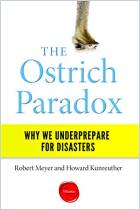加入 getAbstract 阅读摘要

加入 getAbstract 阅读摘要
David Ropeik
How Risky Is It, Really?
Why Our Fears Don't Always Match the Facts
McGraw-Hill, 2010
看看什么内容?
A guide to risk evaluation: How can you tell how scared to be?
Recommendation
This lively, honest book is a pleasure to read and easy to digest. Journalist David Ropeik demystifies the common mental and social mechanisms humans use to evaluate danger. He explains how people often misrepresent and misunderstand possibly perilous circumstances and tells you how to weigh potential risk more accurately. Some explanations are too long and some “risk perception factors” are a bit similar, but, that noted, Ropeik’s many insights are so instantly applicable that any reader will find them useful. getAbstract recommends his book to anyone involved in risk management and social policy, and to all consumers of the news.
Summary
About the Author
David Ropeik is the co-author of RISK and has written for major metropolitan newspapers.





















Comment on this summary